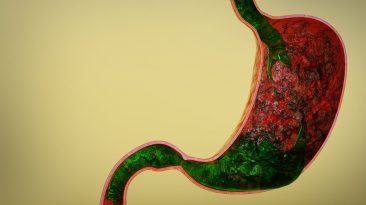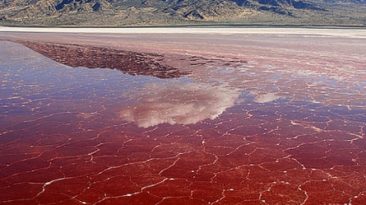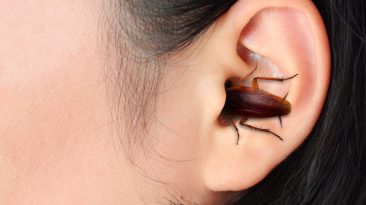It’s everyone’s favorite fruit. It’s everyone’s favorite sport. It’s a watermelon seed spitting contest.
Not only is it the most competitive event at your county fair, it might also be the most dangerous. Ever wonder what would happen if you accidentally swallowed a watermelon seed?
Could a watermelon vine grow in your stomach? How could something so small survive the destructive pool of acid that sits in your stomach? How big would it grow? And would growing fruit in your body mean you’d never have to make another trip to the market? Or would it result in a very long stay in the hospital?
It doesn’t happen often, but seeds can grow inside you. A 28-year old Russian who went to the hospital complaining of chest pain was rushed into surgery when doctors discovered a 5 cm (2 in) fir tree growing in his lung.
And in Massachusetts, a 75-year-old man was also treated for a growth in his lung, after a pea seed in his food went down the wrong tube. But to survive and thrive in a habitat as hostile as your stomach, it would have to be one really determined seed.
Your stomach secretes enzymes and hydrochloric acids that break down any food you swallow, and it kills any harmful microbes that might’ve hitched a ride in. The hydrochloric acid in your stomach is so strong that it even poses a risk to the organ it’s meant to protect. This is why your stomach also secretes a mucus. It lines your stomach walls so that the acid doesn’t burn through.
So if a seed has any chance of surviving in your stomach, it’s going to have to adapt and evolve, and fast. Unfortunately, you’ll feel every grip and blow of this biological grudge match. So prepare for the worst stomach ache of your life. You may never eat another piece of fruit again.
In a world where seeds could easily grow in your stomach, the demand for seedless fruits and vegetables would skyrocket. Even if it meant the price of produce would jump. Because of all the extra time it would take to remove every little seed, people would rather pay more, or not at all, for the privilege of not turning into a fruit tree.
This would be a world in which seeds have adapted to grow much faster than ever before, since it normally takes several weeks for a seed to germinate, while the stomach digests its food within a few hours. Seeds need warmth, moisture, and oxygen to germinate, and you’ll find all of that in the stomach. But you’ll also find hydrochloric acid.
The hydrochloric acid would have no trouble dissolving a seed’s protective coating, which would allow the seed to absorb some water and start to grow. The seed would then move on to the duodenum, which is the start of your small intestine. This is where your body starts to absorb vitamins, minerals, and other nutrients. Inside the duodenum, it’s dark and moist, with neutral pH levels. The first sprouts from a seed could start to grow here, but they would need to be tough enough to survive the intestinal juices.
Assuming that the plant growing inside you could survive this intestinal assault, it might steal some of the nutrients you’re trying to digest. And if the plant were able to get enough nutrients, it might even start to grow flowers and produce fruit.
Hopefully, you would have gone to the hospital long before this point, because with branches, flowers, and fruit growing inside you, the pain would be unbearable. And it would only get worse.
Plants typically grow towards the Sun. Would they try to grow their way out of us to catch some rays? Or would they continue to take nutrients from the other foods we digest? Would we start to form a symbiotic relationship with the plant, where we’d give it some nutrients, it would grow fruit, and we’d digest it and grow the new seeds?
If that’s the case, you’d have to be extra careful about which seeds you swallow. Some of them, like the apple seed, are toxic. Apples, along with more than 2,000 other plant species, produce cyanogenic glycosides. In large doses, they can cause cyanide poisoning, neurological disorder, and delay or slow growth.
The best thing you could do, in a world where seeds can grow in your stomach, is not to eat any seeds under any circumstances. Pay the extra money for the seedless fruit. Put your life before your pride, and walk away from that seed-spitting contest.
You’ll thank us later when you’re not a walking watermelon. Luckily, we don’t live in a world where that’s a risk. The possibility of seeds germinating and growing in the stomach is zero.
While there have been rare cases of plants growing in the lungs, the stomach is much too harsh an environment for any seed to survive there. But speaking of surviving harsh environments, we’ve got a new show that focuses on just that, and it might even save your life one day. Have you ever wondered if it’s possible to survive something as deadly as a solar storm?
Subscribe to What-If on YouTube or follow the show on Facebook Watch.
Sources
- “Stomach: Facts, Functions & Diseases”. Contributor, Alina. 2015. livescience.com.
- “Toxicity Potential Of Cyanogenic Glycosides In Edible Plants”. K. Nyirenda, Kumbukani. 2020. Medical Toxicology [Working Title]. doi:10.5772/intechopen.91408.
- “Your Digestive System”. 2020. kidshealth.org.
- “Too Strange To Be True? Tree Found Growing In Man’s Lung”. 2020. Discover Magazine.
- “How can a pea plant grow in the lungs?”. Blue, Laura. 2020. TIME.Com.
- “How To Grow Watermelon Plants – Gardening Tips & Advice, Seeds & Plants At Burpee.Com”. 2020. burpee.com.




























[…] Eso no suena como un gran lugar para germinar. Aunque las semillas tienen una cubierta protectora que podría ayudarles a no ser digeridas del todo… […]
[…] Eso no suena como un gran lugar para germinar. Aunque las semillas tienen una cubierta protectora que podría ayudarles a no ser digeridas del todo… […]
[…] Eso no suena como un gran lugar para germinar. Aunque las semillas tienen una cubierta protectora que podría ayudarles a no ser digeridas del todo… […]
[…] Eso no suena como un gran lugar para germinar. Aunque las semillas tienen una cubierta protectora que podría ayudarles a no ser digeridas del todo… […]
[…] Eso no suena como un gran lugar para germinar. Aunque las semillas tienen una cubierta protectora que podría ayudarles a no ser digeridas de… […]